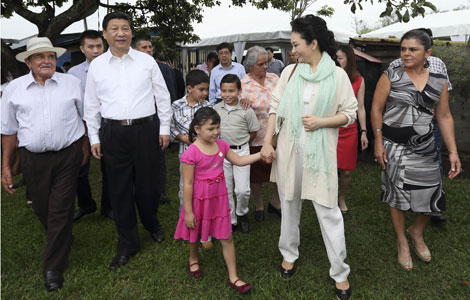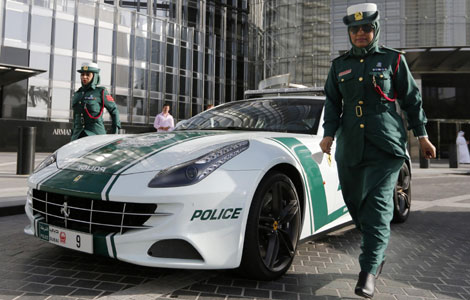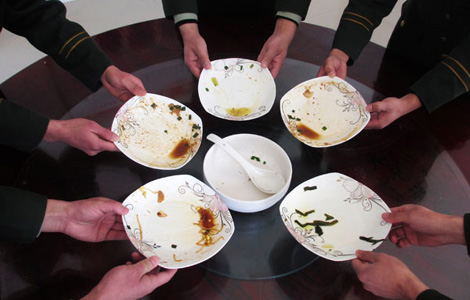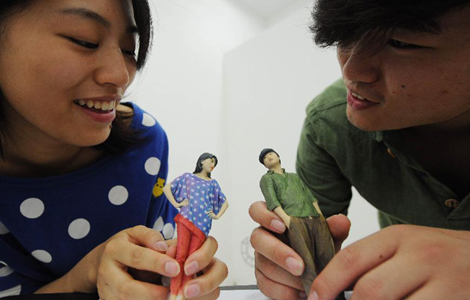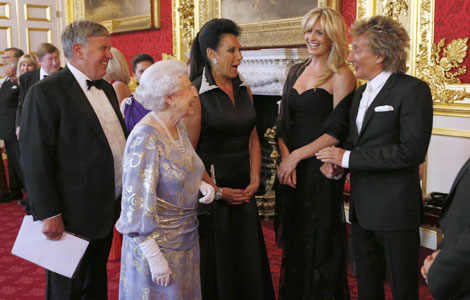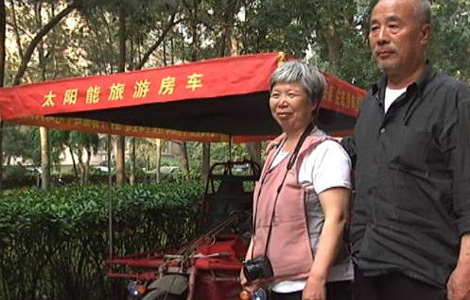Egypt looks at long political road ahead
Updated: 2013-04-18 08:02
By Wang Jinglie (China Daily)
|
||||||||
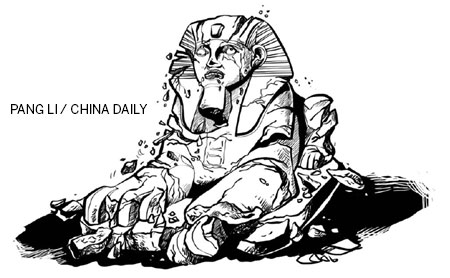
Although the retrial of former Egyptian president Hosni Mubarak has been delayed because the Cairo judge hearing the case withdrew on Saturday, Egypt's political divisions are clear. Both pro- and anti-Mubarak demonstrators had gathered outside the court in support of their conflicting causes.
Mubarak, 84, ruled Egypt for almost three decades until he resigned in the face of mass protests in February 2011. Before entering politics, Mubarak was a pilot officer in the Egyptian Air Force, rising to the rank of commander. He has made great contributions to Egypt's security and at one time was hailed as a "national hero".
Mubarak was appointed vice-president of Egypt in 1975, and became the president and supreme commander of the armed forces in 1981 following the assassination of the then president Anwar Sadat.
During his presidency, Mubarak pursued an open policy, promoted economic development and maintained political and social stability. On the diplomatic front, Egypt played an important role in Middle East affairs as a moderate country.
But the later years of Egypt's longest serving president were "sad and dreary". In August 2011, Mubarak was sentenced to life imprisonment for launching a violent crackdown on demonstrators, and from a "national hero" he became a "prisoner".
The trial of Mubarak has given Egyptians the opportunity to review their history, as Mubarak's case reflects the historical limitations of a political leader and military commander during a country's political development and social transition.
That the Cairo court accepted Mubarak's appeal against his life sentence reflects the significant changes in Egyptian society since August 2011. It shows that despite the political turmoil of the past more than two years, Egyptians in general are moving closer to building a society ruled by law, with all political forces trying to use the law as a weapon. This does not mean that Egypt has already established a modern legal system based on democratic politics. It has taken a small but important step in that direction, though.
As Egypt entered the post-Mubarak era, various political forces in the country entered into a new rivalry, fierce in many respects. There are forces that support and oppose Mubarak, and there are secular forces as well as Islamist groups, either moderate or radical. Mubarak's retrial has become an important political test for these forces.
Moreover, more than two years of political crisis has contributed to the worsening economy. After experiencing a momentary "victory" and subsequent pains brought about by two years of turmoil, Egyptians have to a certain extent become politically more mature and thus more rational, a development which will find reflection in the retrial of Mubarak.
When Mubarak was forced to resign two years ago, the protesters at Tahrir Square cheered the fall of the "Last Pharaoh". But shortly after the election, people again took to the streets and gathered at Tahrir Square to protest against the new president, Mohamed Mursi, whom they dubbed the "New Pharaoh", for grabbing all the power.
How could the "revolution" in Egypt overthrow the "Last Pharaoh" only to install "New Pharaoh"?
Egypt's recent history shows that the latest "revolution" is in line with earlier social changes. Since the beginning of this century, Egypt has amended the constitution four times, with the 2005 amendment establishing direct elections for the presidency being very important. After Mubarak resigned, Egypt's constitution was amended for the third time in the new century. The new draft constitution was adopted in December 2012, making the principles of Islamic law the main source of legislation.
In the 2005 presidential election, the first to be directly contested in Egypt, Mubarak won 88.6 percent of the votes, compared with just 51 percent won by President Mursi in 2012. Mursi's supporters come mainly from the Muslim Brotherhood and its followers. While most of the other parties that form the opposition are secular forces that advocate reform and allege that the new president has usurped all the powers. They accuse Mursi of seizing the legislative and executive powers to direct the armed forces to arrest people who "disturb" the social order and "purge" the judicial organs and the military of "unwanted" elements.
Over the past more than two years, the situation in Egypt has been unstable and some of the about 30 large-scale popular demonstrations have been targeted at Mursi. The emergence of the "New Pharaoh" shows that Egypt still has a long way to go before it completes its democratic transformation.
The author is a researcher in Middle East studies at the Chinese Academy of Social Sciences.
(China Daily 04/18/2013 page9)
Most Viewed
Editor's Picks

|

|

|

|

|

|
Today's Top News
Relationship 'relaunched'
Good start expected for summit
Xi, Mexican president discuss bilateral co-op
Cooperation to drive mutual growth
Chinese president arrives in Mexico for state visit
China is victim of hacking attacks
US to be largest trade partner
China joins fight against hacking
US Weekly

|

|
